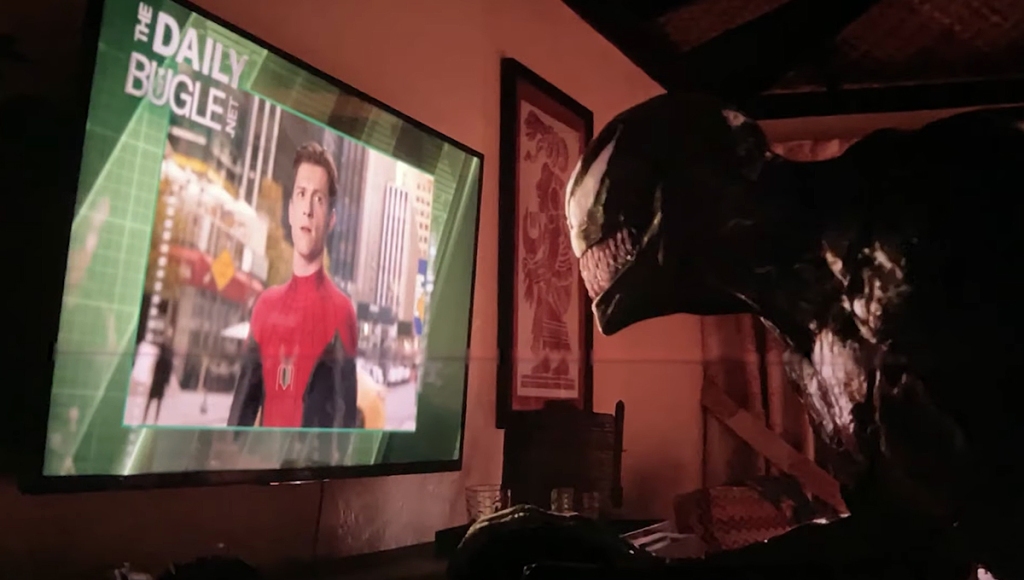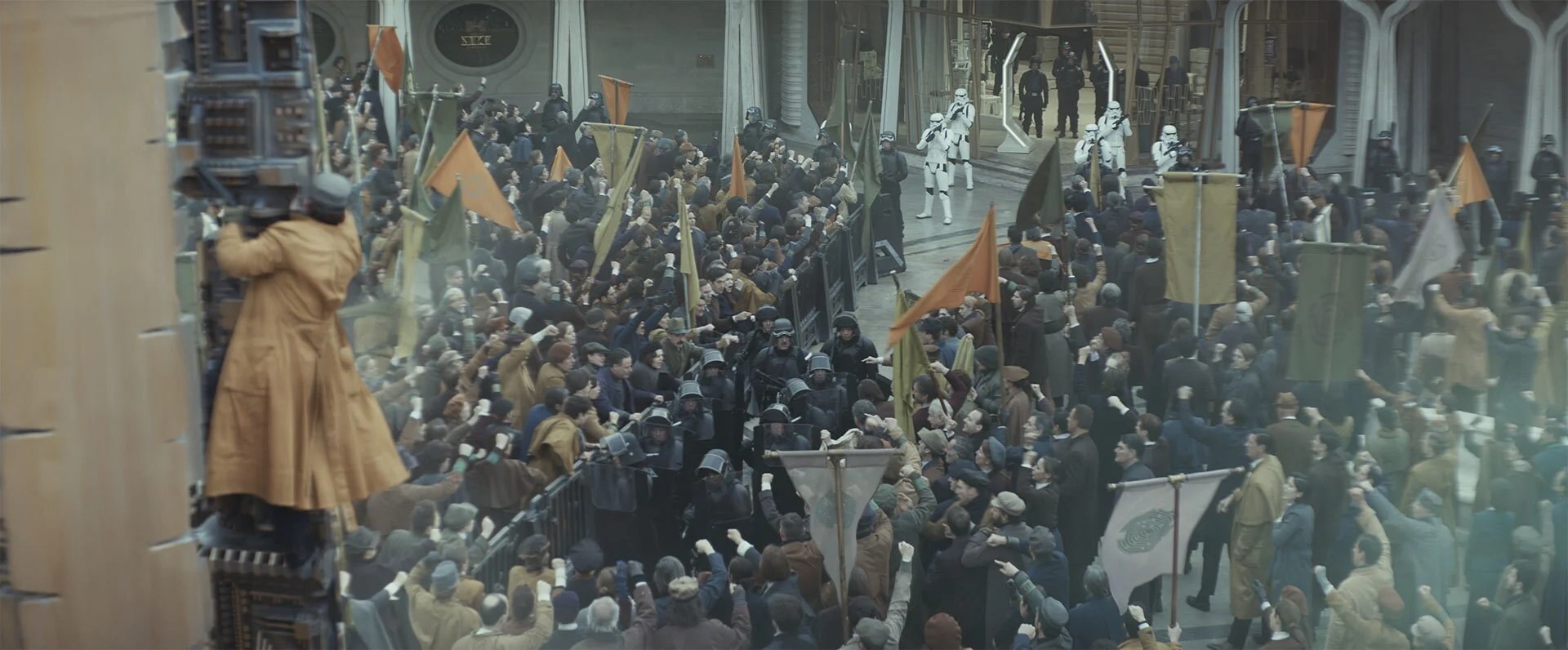Big ambitious movies can come in small packages.
The comedy Downsizing is out in theaters today that stars Matt Damon as a man in a soul-searching adventure after he pays to be scaled down in size with a new shrinking technology.
The film also stars Christoph Waltz (Inglorious Basterds, Django Unchained), Hong Chau (Inherent Vice, Big Little Lies), Kristen Wiig (The Martian, Bridesmaids), Udo Kier (Melancholia), Jason Sudeikis (Colossal), Laura Dern (Wild, Star Wars: The Last Jedi), Neil Patrick Harris (Gone Girl), and Rolf Lassgard (A Man Named Ove).
Director Alexander Payne (The Descendants, Sideways) helmed Downsizing. He co-wrote the screenplay with Jim Taylor (Sideways). Mark Johnson (Rain Man, The Chronicles of Narnia Series) and Jim Burke (Election) produced the film.
Here’s a synopsis of the film:
Downsizing imagines what might happen if, as a solution to over-population, Norwegian scientists discover how to shrink humans to five inches tall and propose a 200-year global transition from big to small.
People soon realize how much further money goes in a miniaturized world. With the promise of a better life, everyman Paul Safranek (Matt Damon) and wife Audrey (Kristen Wiig) decide to abandon their stressed lives in Omaha for a new downsized community, taking the irreversible leap that will trigger life-changing adventures when they become small.”
LRM sat down with co-writer Jim Taylor and producer Mark Johnson in an extensive interview about Downsizing earlier this month. We discussed the controversial questions from a press conference earlier in the day. We also talked about the film’s intention to be more of a fun, entertaining comedy rather than a social commentary on climate change and the end of the Earth. In addition, we also looked into ignoring the science of Downsizing and the fun of scaling.
Downsizing is playing nationwide in theaters today.
Check out our full interview down below:
Gentlemen, it’s quite an interesting movie with “Downsizing.” In fact, I was sitting there at the press conference and I was going, “Gosh, this is a little awkward.” [Laughs]
Jim Taylor: Do you know what is interesting about the press conference? I thought it went fine. I liked all the questions.
[Turns to Mark Johnson] You and I haven’t talked about it, but I talked to Alexander [Payne]. Somehow on what’s not communicated, unless you disagree with me, is how much fun the movie is. Yes, it’s about on how the world is coming to an end, climate change and questions about Hong’s character. This is a comedy. It’s an audience movie. If I listened to that press conference, then I would say, “This is some serious stuff.”
I’ve heard a lot of people in the past couple of days say, “Is it a comedy? Is it a social satire? Is it a doomsday [movie]?” I guess my answer to that is it’s all of them.
The one thing I wasn’t hearing based on the press conference is on how much fun and how funny the movie is.
I think that’s why Paramount is trying to sell that it’s a comedy. I sat down to watch the film and I thought it started off as a comedy. Then later I realized maybe it was a social commentary or satire. Were these some of the themes you were trying to tackle? Or were you really all focused on comedy?
Mark Johnson: First comes the human story. Second comes the comedy. Third comes the message. I’m most interested in that order.
I totally agree with you about those people in the press conference room. On the other hand, yes, it is a comedy. It’s also a movie that is thought-provoking and talked about. I wondered if it’s a sign of talking. Not for the race issue though.
That was a little out of left field, wasn’t it?
Mark Johnson: Well, it hasn’t been, unfortunately. It hasn’t been coming from the Asian community. It comes from the young, white male bloggers.
Now there was that different question about the “haves” and “have-nots.” That’s a big question and I don’t mind that question.
Jim Taylor: No, it’s a good question. I understand she was from Black Nerd Girls.
Yeah. She’s from Black Nerd Girls.
Mark Johnson: For something with a funny name for a group, the question [didn’t pose] a lot of sense of humor. She’s being a crusader for something worth being a crusader for.
Jim Taylor: You’re absolutely right. Your answer is true. The movie is not trying to show the world on what it is. We’re not in any way trying to be descriptive on this is what’s going on.
In my case, as ambitious for the movie, it accomplishes to be satisfying for a very simple question. What can you do? It just finds a place in life. The world is coming to end–he’s going to be a good man.
At the beginning of the movie, he has two women he was trying to feed. Neither one of them wants the food. His mother has already eaten. His wife has a splitting headache. Towards later in the movie, he feeds [Rose Bianco] and thanks him to appreciate it. He sorts of found…
Mark Johnson: It’s really good screenwriting.
Jim Taylor: [Laughs]
Are you surprised that different audience members are getting different messages from watching the same movie?
Mark Johnson: No, I’m not surprised. That would be a plus. Unless it’s the wrong message, in which it would be disturbing. I can take a lot of criticism about this thing or that thing, but this issue about her accent…she is the fully formed character in the film. With that, I would push back against.
Jim Taylor: In what I’m so proud of, this is my first movie in working with those guys, I’m truly am a newcomer. They worked together with the same cinematographer, same editor, same costume designer and same composer. What I’m so proud of is that everybody says the movie is what they want. It’s original. There’s nothing out there like this movie. There are certain amount of reviewers and audiences that would come up against that.
But, what is it? I can’t tell. I can’t liken it to something else. It’s own hallmark.
When you guys came up with the story, did you think the concept was remotely possible? Did you look at science? Can this actually happen?
Mark Johnson: It’s interesting. There are many ways that you’ll have to nod that it’s no way. We have to completely look past it. [Laughs]
On the other hand, there is a lot of discussion in science about scale and survivability. There’s not scientific precedence of downsizing, but for smaller creatures doing better. Mostly, we had to tip our hat to science and then look the other way.
Jim Taylor: I loved on what they’ve written into the script and what they did in shooting it–it’s how believable this whole process is. On one hand, it’s absurd on the first time we see the Norwegian doctor doing it and we hear something like a microwave.
Oh, yeah. Sitting in the audience, I was like, “Is that a microwave?” [Laughs]
Jim Taylor: But, the idea of the explanation of this is what we do it and this is how we do it. We have to take all the metal out. You’ll see the teeth being removed. Hong Chau saying, “His head explodes. His head explodes. Stupid people forgot to take his fillings out.” And his head exploded.
All of that made sense, Niecy Nash even said, “I do it in a second, but my husband had a hip replacement. He’s ineligible.”
It starts to make sense. It totally makes sense if this overpopulation is this horrendous problem, which it is. If you’re smaller, then you’ll eat less and waste less.
Of course, we’re human. We say, “The hell we’re doing good for the planet. I can have a bigger house. I could do more things than the full-size world.”
I loved the logic part of it. There’s a part of me saying and believing that this could happen.
Mark Johnson: At the test screenings, I had to point out that we had not heard anyone say, “That could never happen.” Their voices could be like this or that. We completely crossed that [line]. It could easily kill your movie. You can say it’s real, but it’s not real so I’m not going with it.
We’re watching it with the intention that it’s a fantasy. We’re not going into technical details. A giant person talks and then the eardrums of a small person would explode.
Jim Taylor: We had our head of the visual effects supervisor spent way too many hours and too many dollars on making the water more realistic. The boat this size, in the calmness of Norway, would bounce around a lot.
Mark Johnson: The point is it never calls attention to itself, which is not good.
For the production itself, I loved the fact that some things being small and other things being big. When you guys were on the set, how did you come up with the big cracker or the big rose?
Mark Johnson: We wanted to be judicious about those things. We didn’t want the whole moving being about that. We didn’t want you to be distracted by that. But, we wanted to have with it.
I realized, during we had trouble pulling the finance together, that we should’ve made some props in trying to get the movie financed. You could’ve walked in with this saltine cracker and it would’ve sold it. Our propmaster was amazing.
Jim Taylor: It’s interesting. The audiences really liked scale comparison.
Mark Johnson: We cheated them out of it a little bit.
Jim Taylor: We felt we gave it to them. Leisure Land exists. So there is no need to see a large something. You didn’t need people talking and some large person walking by them. Then you’ll forget about the characters.
People did love the saltine cracker. The humiliation of Matt signing the divorce papers at that small. His lawyer saying to him, “Write bigger.” It’s the [humor] that my wife sued for divorce and got a pretty good deal out of it. And now you’re telling that I got to write larger too?
As I was watching, it was like a Gulliver’s Travel adventure. You didn’t have little people walking around in the big person’s world.
Mark Johnson: It’ll be too dangerous.
You’re right. It’ll be too dangerous.
Mark Johnson: The movie did do it in some ways. You have to think on how frightened you’ll be.
Jim Taylor: One of my favorite moments and Matt’s reaction to it is when someone said, “I work with my brother. He’s real sized and my wife too.” Then we cut to Matt and his expression was, “How does that work?” [Laughs]
Mark Johnson: If it’s successful enough, we have a lot of material for a sequel. We never been thought to be asked for a sequel, but this one for sure.
So you already thought about sequels?
Mark Johnson: Oh, yeah. Not in selling a franchise to the studio, but it could be. If people like it and they go, “Oh! I want to see where these people go next or before that.”
Talk to me about the cast. How did you assemble everyone? I understand Matt Damon has a big name, thus a big draw to the film. You’ve brought in Kristin Wiig, Christoph Waltz, and all those other great people.
Jim Taylor: The way I understand it–as Matt told me–as soon as Alexander asked him to do it–he was in. He said to me, “I would’ve done the phone book with Alexander Payne.”
Mark Johnson: He thought Alexander was joking when he pitched the story to him. This is what I’m doing in which you get small. He reaction was “Yeah.” [Laughs]
Jim Taylor: As for Kristin, it’s an odd one that I can’t talk about it. People are surprised when she doesn’t come back at some point. It’s a little like Janet Lee in Psycho. She’s the movie star and killed in the second reel. What? What just happened? What movie am I watching?
She has proven herself to be such a dramatic actress too. Did you see the Skeleton Twins by any chance?
No, I did not.
Jim Taylor: She’s very, very good in that. For Christoph, we talked to a number of people.
Mark Johnson: We weren’t entirely convinced. We’ve seen [the character] to be a bigger guy. When Alexander met Christoph–obviously he nailed it. He’s always great.
Let me talk about one more theme, obviously, there is this climate change/global warming theme. I just logged on to CNN this morning and the headline predicted the greenhouse gases are now melting Greenland–we’ll all be underwater soon. I can really show the headline to you guys, but this is the headline right now.
Mark Johnson: Really?
Jim Taylor: They wrote this [story] twelve years ago.
Mark Johnson: It’s been around for a while.
Jim Taylor: It couldn’t be more topical than today. It’s not like someone read the headlines and told themselves to write a movie about the collapsible of the world.
Mark Johnson: Alexander keeps pointing out that the wall was something that didn’t have the resonance when we wrote it. But it does now. It’s the idea of the “haves” and “have nots.” It’s just keeping them on the other side of the wall.
Are you proud of the fact you guys predicated correctly on these things?
Mark Johnson: [Laughs] It’s nice to feel relevant.
Jim Taylor: I’m not so sure on being proud of it. I’m very pleased that it’s so of the moment. It’s one of the bigger appeals of the movie. Keep on saying that it’s the way of being most optimistic in which the world is coming to an end. It’s just the question of when.
Let me wrap it up with one last question with you guys. Did you wish downsizing actually exist in real life? And would you do it?
Mark Johnson: I don’t know about wish. It’ll be interesting. But, I don’t think so. There are more versions of science that’ll be more likely to come true. A race of tiny people would be scary. I would not be an early adopter. I would be one of those people who would wait to see on how it went.
Jim Taylor: I would get this behind you. Oh, really? Is he okay? [Laughs]
Mark Johnson: We had a whole thread on about pioneers. They would have to get people real incentives to do it at first. There are militarily environmental people. But, there will also people who would do it to become wealthy. There just be so many questions.
Jim Taylor: Also, it’s too late now. Small people will be underwater a lot quicker than us now.
That is true. Anyways gentlemen, thank you very much.
Downsizing is playing nationwide in theaters today.
Don’t forget to share this post on your Facebook wall and with your Twitter followers! Just hit the buttons on the top of this page.
 FOR FANBOYS, BY FANBOYS
Have you checked out LRM Online’s official podcasts and videos on The Genreverse Podcast Network? Available on YouTube and all your favorite podcast apps, This multimedia empire includes The Daily CoG, Breaking Geek Radio: The Podcast, GeekScholars Movie News, Anime-Versal Review Podcast, and our Star Wars dedicated podcast The Cantina. Check it out by listening on all your favorite podcast apps, or watching on YouTube!
Subscribe on: Apple Podcasts | Spotify | SoundCloud | Stitcher | Google Play
FOR FANBOYS, BY FANBOYS
Have you checked out LRM Online’s official podcasts and videos on The Genreverse Podcast Network? Available on YouTube and all your favorite podcast apps, This multimedia empire includes The Daily CoG, Breaking Geek Radio: The Podcast, GeekScholars Movie News, Anime-Versal Review Podcast, and our Star Wars dedicated podcast The Cantina. Check it out by listening on all your favorite podcast apps, or watching on YouTube!
Subscribe on: Apple Podcasts | Spotify | SoundCloud | Stitcher | Google Play







